External links
- "Book Interview: Translator Brian Nelson on Finally Hearing Émile Zola's Voice in English", artsfuse.org, May 2021
Brian Nelson (born 29 September 1946 in Holbeach, Lincolnshire, UK) is a professor emeritus of French Studies at Monash University, Melbourne.
Nelson graduated with an undergraduate degree from Cambridge University and did postgraduate work at Oxford University where he obtained his D.Phil. in 1979. [1] Before going to Monash he taught one year in Paris (1970–71) and several years at the University of Wales Aberystwyth (1973–86). In 1986, he became professor at Monash and retired in 2008. [1] Nelson taught modern French literature and cultural history, and literary translation. [1]
In addition to a number of monographs including Zola and the Bourgeoisie and Émile Zola: A Selective Analytical Bibliography, he has made a number of modern translations of Émile Zola for the Oxford World's Classics series. [2] [1] Speaking about his translation of The Belly of Paris, Nelson said:
Nelson was formerly the editor of the Australian Journal of French Studies (2002-2020), [2] [4] co-founded the journal Romance Studies , [2] [5] edited the monograph series Monash Romance Studies, [2] [1] and is a former President of AALITRA (the Australian Association for Literary Translation). [6] [7]
Author
Editor
Translator

Émile Édouard Charles Antoine Zola was a French novelist, journalist, playwright, the best-known practitioner of the literary school of naturalism, and an important contributor to the development of theatrical naturalism. He was a major figure in the political liberalization of France and in the exoneration of the falsely accused and convicted army officer Alfred Dreyfus, which is encapsulated in his renowned newspaper opinion headlined J'Accuse…! Zola was nominated for the first and second Nobel Prize in Literature in 1901 and 1902.
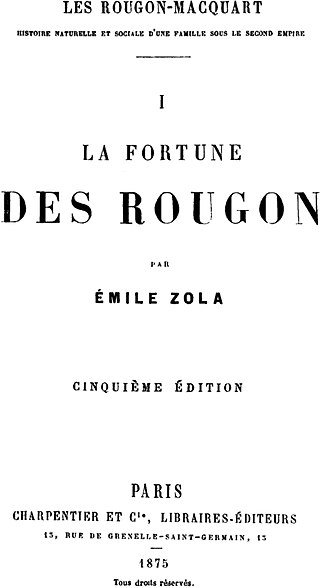
La Fortune des Rougon(The Fortune of the Rougons), originally published in 1871, is the first novel in Émile Zola's monumental twenty-volume series Les Rougon-Macquart. The novel is partly an origin story, with a large cast of characters - many of whom become the central figures of later novels in the series - and partly an account of the December 1851 coup d'état that created the French Second Empire under Napoleon III. The events are experienced through the eyes of a large provincial town in southern France. The title refers not only to the "fortune" chased by protagonists Pierre and Felicité Rougon, but also to the fortunes of the various disparate family members Zola introduces, whose lives are of central importance to later books in the series.
Son Excellence Eugène Rougon is the sixth novel in the Rougon-Macquart series by Émile Zola. It was serialized in 1876 in Le Siècle before being published in novel form by Charpentier. It was translated into English by Brian Nelson in 2018.
La Curée is the 2nd novel in Émile Zola's 20-volume series Les Rougon-Macquart. It deals with property speculation and the lives of the extremely wealthy Nouveau riche of the Second French Empire, against the backdrop of Baron Haussmann's reconstruction of Paris in the 1850s and 1860s.

L'Argent ("Money") is the eighteenth novel in the Rougon-Macquart series by Émile Zola. It was serialized in the periodical Gil Blas beginning in November 1890 before being published in novel form by Charpentier et Fasquelle in March 1891.

Au Bonheur des Dames is the eleventh novel in the Rougon-Macquart series by Émile Zola. It was first serialized in the periodical Gil Blas from December 17, 1882 to March 1, 1883; and published in novel form by Charpentier in 1883.
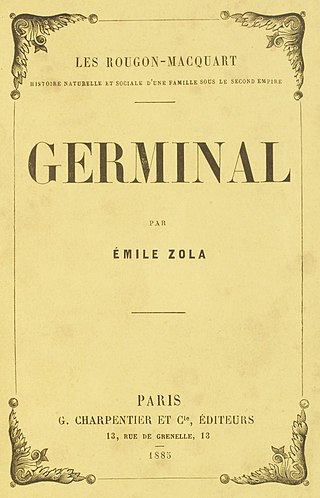
Germinal is the thirteenth novel in Émile Zola's twenty-volume series Les Rougon-Macquart. Often considered Zola's masterpiece and one of the most significant novels in the French tradition, the novel – an uncompromisingly harsh and realistic story of a coalminers' strike in northern France in the 1860s – has been published and translated in over one hundred countries. It has also inspired five film adaptations and two television productions.

Les Rougon-Macquart is the collective title given to a cycle of twenty novels by French writer Émile Zola. Subtitled Histoire naturelle et sociale d'une famille sous le Second Empire, it follows the lives of the members of the two titular branches of a fictional family living during the Second French Empire (1852–1870) and is one of the most prominent works of the French naturalism literary movement.
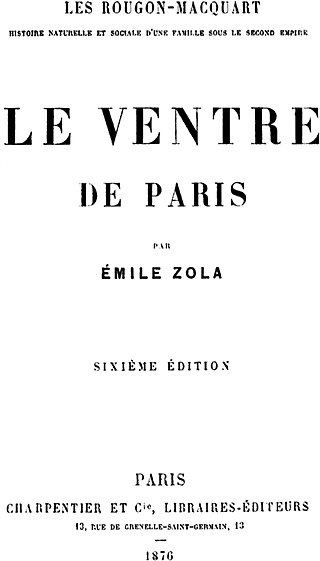
Le Ventre de Paris (1873) is the third novel in Émile Zola's twenty-volume series Les Rougon-Macquart. It is set in and around Les Halles, the enormous, busy central market of 19th-century Paris. Les Halles, rebuilt in cast iron and glass during the Second Empire was a landmark of modernity in the city, the wholesale and retail center of a thriving food industry. Le Ventre de Paris is Zola's first novel entirely on the working class.
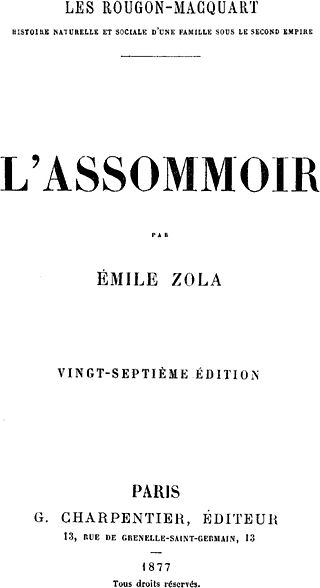
L'Assommoir, published as a serial in 1876, and in book form in 1877, is the seventh novel in Émile Zola's twenty-volume series Les Rougon-Macquart. Usually considered one of Zola's masterpieces, the novel — a study of alcoholism and poverty in the working-class districts of Paris — was a huge commercial success and helped establish Zola's fame and reputation throughout France and the world.
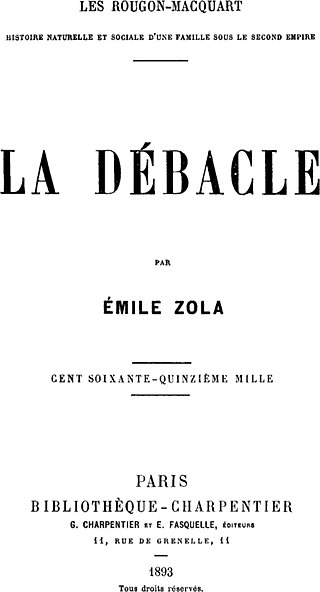
La Débâcle (1892), translated as The Debacle and The Downfall, is the penultimate novel of Émile Zola's Les Rougon-Macquart series, which first appeared as a serial in La Vie populaire from 21 February to 21 July 1892, before being published in book form by Charpentier.
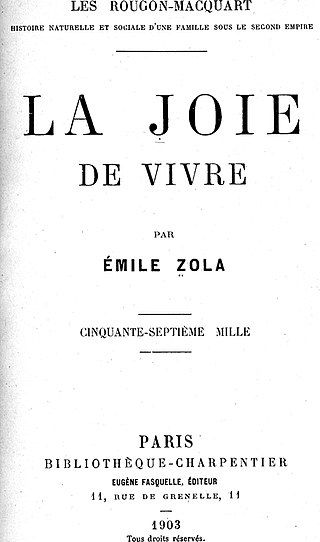
La joie de vivre is the twelfth novel in the Rougon-Macquart series by Émile Zola. It was serialized in the periodical Gil Blas in 1883 before being published in book form by Charpentier in February 1884.
Literary realism is a literary genre, part of the broader realism in arts, that attempts to represent subject-matter truthfully, avoiding speculative fiction and supernatural elements. It originated with the realist art movement that began with mid-nineteenth-century French literature (Stendhal) and Russian literature. Literary realism attempts to represent familiar things as they are. Realist authors chose to depict every day and banal activities and experiences.
Une page d'amour is the eighth novel in the 'Rougon-Macquart' series by Émile Zola, set among the petite bourgeoisie in Second Empire suburban Paris. It was first serialised between December 11, 1877, and April 4, 1878, in Le Bien public, before being published in novel form by Charpentier in April 1878.
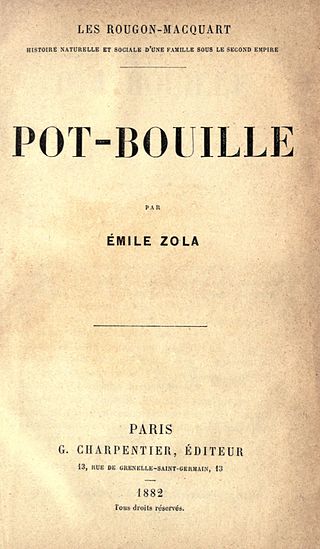
Pot-Bouille is the tenth novel in the Rougon-Macquart series by Émile Zola. It was serialized between January and April 1882 in the periodical Le Gaulois before being published in book form by Charpentier in 1883.
Le Docteur Pascal is the twentieth and final novel of the Rougon-Macquart series by Émile Zola, first published in June 1893 by Charpentier.
Ernest Alfred Vizetelly (1853–1922) was an English journalist and author.

Peter R. Bush is an English literary translator. He has translated works from Catalan, French, Spanish and Portuguese to English, including the work of Josep Pla, Joan Sales and Merce Rodoreda.

Rita Schober was a German scholar of Romance studies and literature.
Hannah Jane Thompson is a British academic and professor of French and critical disability studies at Royal Holloway, University of London. Her research focuses primarily on 19th and 20th century French literature, especially the novel.